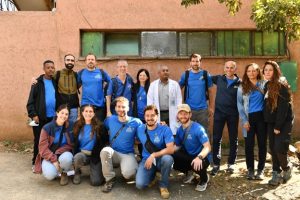
Though recently women’s affairs have gained momentum through legislating new family law and appointing them in top public offices, still the majority of women are socially and economically marginalized.
In rural parts of Ethiopia vestiges of outmoded cultures such as abduction and early marriage, which abort their educational pursuit and darkens their future, are prevalent.
As a result, many of them are still denied access to land and property inheritance, their fate falls in the hands’ of a society with a patriarchal mindset. Hence unless the situation is changed for the better not only women life but also society’s aspiration towards progress could suffer curtailment.
Johannes Solomon is a coordinator in government owned women entrepreneurship development project. As to him, the project began seven years ago after the government secured 50 million USD loan from the World Bank.
Currently, the project is due to enter into its final phases but after the institution reached agreement with the World Bank, it has prepared a proposal to prolong the project for additional two years .It has got a green light.
The main objective of the project is to provide loan to women who engage in small scale enterprises, while they are promoted to the higher level.
At this stage, they face shortage of money because the business requires more capital and it is hard to secure loan from banks due to lack of personal property which serves as collateral. In addition, in order to enhance their computational capacity and win the market they need more skills and knowledge which in turn needs more money.
Moreover, as most businesses are dominated by males, it proves hard for them to compete. Hence, to overcome these shortcomings, the government has brought into play the project to assist them through loan provission.
Initially the project began in six towns and extended to ten towns among others, Mekele, Aksum, Dilla, Addis Ababa, Dire dawa, Assela, Hawassa, Jimma,Harar and Adama. Currently, the number of towns has risen to 99 and more than 10 300 women have got access to loan. The loaned money totals 2.6 billion Birr, out of which 1.74 Billion Birr is loaned to women residing in Addis Ababa.
Over 14810 beneficiaries are engaged in trade, while 8000 engaged in service provision. And by now they are striving to uplift their enterprises status to the manufacturing industry level.
The range of loan provided to a person is up to 250 thousand Birr. But still most women residing in rural parts of the country are unaware of such credit schemes.
The beneficiaries could improve their businesses and save money which surpassed their capital. In addition they could create job opportunities to the unemployed and purchase machinery. Others also stepped up their small businesses to livestock production, agriculture and poultry.
Inspired by this achievement donors and other partners have continued extending their support to the project.
Asked whether the project faced any challenge in its day-to-day activities Johannes said that, with regard to providing loan to beneficiaries, no such difficulty was witnessed as they know what they must do with the money and take it based on the criterion. But the challenge lies in their reluctance in attending training which helps them to upgrade their management skills and such a situation might put them in disadvantageous position in this regard.
The project has a plan to provide training for 20 thousand women. But till now it is only 16 thousand women who are trained by professionals from a manufacturing college.
As to the project plan, the number of trainees should have shot up to more than 20 thousand but unfortunately the intended plan has not yet been met. Therefore, the project is expected to expand its sensitization work up to the Woreda level.
Asked whether the project could regain the loan money as per the scheduled time frame, Johannes said that women, by their nature, respect their words of honor. They as well have traditional skills in how to allocate the loaned money responsibly.
Initially, they took small amount of money as per their own refunding capacity and when they understood the benefit, next time, they borrow more money.
Many could get loan twice or trice and return back the money as per the schedule. It is very interesting that loan provider small-scale saving and credit associations confirm that there is very small amount of unreturned money and almost 98 percent of it is refunded and such factors further indicate the effectiveness of the project.
According to the World Bank study the project has enhanced the beneficiaries’ income, increased their capacity to employ workers and it could manage to create jobs up to 15 people per enterprise. On the average each enterprise has employed more than three people.
As mentioned above up on the inception of the project, the WB provided 50 million USD and while the project proved its viability the Italian government provided 15 million Euros.
Furthermore the government of Japan funded the project by injecting 50 million USD into it. Currently, the Ethiopian government reached agreement with European Union Investment Bank to secure 30 Euro in the form of loan and such situation in general is enhancing the project’s loaning capacity from time to time.
The loan scheme is planned to be utilize the money as a revolving fund and ones the credited person pays back the money, it will be again lent to another person. This further strengthens the effectiveness of the project.
The Ethiopian Herald Sunday Edition 15 September 2019
BY ABEBE WOLDE GIORGIS





